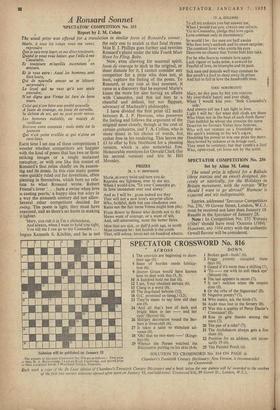A Ronsard Sonnet
SPECTATOR' COMPETITION No. 253 Report by J. M. Cohen
The usual prize was offered for a translation in similar form of Ronsard'is sonnet : Marie, a tons les coups vous me venez reprendre
Que je suis trop leger. et me dites tousjours, Quand je vous veus baiser, que faille a ma Cassatuire,
Et tousjours m'apelles inconstant cn amours.
Et je veus estre : Aussi les hommes sons bien lours, Qui de nouvelle amour ne se laissent surprendre : Le loyal qui ne vent qu'd une seule entendre, Nest digne que Venus lui face de bons tours.
Celui qui nose faire une amitie nouvelle A faute de courage, ou faute de cervelle, Se defiant de soi, qui ne pent avoir miens. Les hommes malades, ou mattes de vieillesse Doivent estre constans : mais sotte est la jeunesse Qui West point eveille.e et qui n'aitne en cent liens.
EACH time I set one of these competitions I wonder whether competitors are happier with the kind of poem that has two or three striking images or a single sustained metaphor, or with one like this sonnet of Ronsard's that relies chiefly on its reason- ing and its music. In this case many poems were quickly ruled out for inventions, often pleasing in themselves, which bore no rela- tion to what Ronsard wrote. Robert Friend's lover'. . . feels a swine when love is casting pearls,' a happy idea but witty in a way the sixteenth century did not allow. Several other competitors decided for swing. The poem is light, they must have reasoned, and so there's no harm in making it lighter.
'Mary, you rub it in I'm a philanderer,
And always, when I want to hold you tight, You tell me 1 can go to my Cassandra ...'
begins Kenneth S. Kitchin, and he is not
the only one to snatch at that fatal rhyme. Miss E. J. Phillips goes further and rewrites Ronsard's plaint under the title Youth Must Have Its Fling, Babe.
Now, even allowing for seasonal spirit, faute de courage to stick to the original, or sheer distaste for it, I cannot consider any competitor for a prize who does not, at least, capture the feeling of the poem. To Ronsard, at any rate at that moment, it came as a discovery that he enjoyed Marie's kisses the more for also having an affaire with Cassandre, and this led him to a cheerful and defiant, but not flippant, advocacy of Macheath's philosophy.
I have divided the first prize (£2 each) between R. J. P. Hewison, who preserves the feeling and follows the argument of the original most closely, though at the cost of certain archaisms. and T. A. Collins, who is more direct in his choice of words, but rather free in his rendering. This leaves me to offer to Eric Northcott for a pleasing version, which is also somewhat free. Honourable mentions for Oswald Clark (for his second version) and Iris St. Hill M ousley.
PRIZES
(R. J. P. IISWISON) Marie, at every twist and turn you do Reprove my lightness, ever to me say, When I would kiss, 'To your Cassandra go, In love inconstant ever and alway.' And so 1 will be: gross indeed are they That will not a new love's surprise allow. Who, faithful, doth but one obedience owe Rates not the fair turns Venus might him play. From flower to flower who dareth not to flit Shews want of courage, or a want of wit, And, self-mistrusting, none the better fares. Men that are sick, or dull'dywith age, in sooth Must constant be : but foolish is the youth That, still asleep, loves not an hundred wheres.
To all my ardours you but answer me, When 1 would kiss you, always one refrain. 'Go to Cassandra, pledge that love again Love constant only in inconstancy.'
So would 1 be : for men are half awake Who fear love's ambush and its sweet surprise; The constant lover who averts his eyes Deserves no chance that Venus bids him take.
For he who fears to venture love again Lack vigour or lacks sense, a coward he Fearful of love, its triumphs and its pain.
Sick men and dotards well may constant be But youth's a fool to sleep away its prime And fail to fall in love the hundredth time.
(ERIC NORTHCUTT)
Mary, no day goes by but you reprove My over-fickle heart; and ever chide, When I would kiss you : 'Seek Cassandra's side.'
And always tell me I am light in love. Light 1 will be : for what dull clods are those Who blaze not in the heat of each fresh flame ! That faithful he whose she remains the same Deserves no favours Venus here bestows. Who will not venture on a friendship new, His spirit's wanting or his wit's astcw, Doubting his power to win one prize the more. Men bowed by sickness or in dotage cool, They must be constant; but that youth's a fool Who, open-eyed, yet loves not by the score.














































 Previous page
Previous page